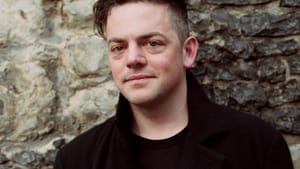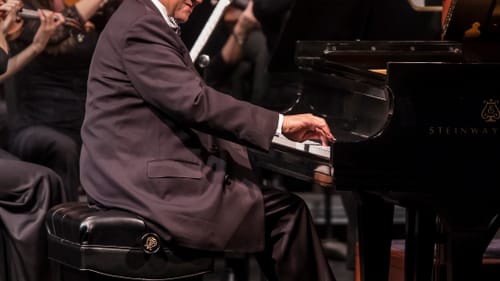Stay in the Loop
BSR publishes on a weekly schedule, with an email newsletter every Wednesday and Thursday morning. There’s no paywall, and subscribing is always free.
Old friends, new works
Philadelphia Orchestra's Opening Night, 2018-19 season

Yannick Nézet-Séguin officially became the fourth music director of the Metropolitan Opera earlier this month. The potential fruits of a partnership between the Met and the Philadelphia Orchestra, which he also leads, can be seen at the orchestra’s opening-weekend concerts, which also nod to the institution’s illustrious past.
The program opens with the world premiere of Liar, an orchestral suite by American composer Nico Muhly. The composition draws from Muhly’s opera Marnie, which will have its U.S. premiere at the Met in November. Although Nézet-Séguin won’t be on the podium for that event, the work and its composer represent his keen interest in contemporary music and young artists.
Here and queer
I have yet to hear the full score of the opera, which premiered at the English National Opera last year. But the 20-minute, single-movement suite captures the creepy, jagged essence of Alfred Hitchcock’s 1964 psychological thriller. It sounds appropriately noirish, with thick, expansive textures representing the title character’s troubled emotional state.
Muhly distills the opera’s vocal writing into musical phrases assigned to the oboe, trombone, and viola. Each instrument stands in for a character, a clever way to replicate dramatic tension in a nonverbal medium. Principal violist Choong-Jin Chang especially distinguishes himself here, the dark foreboding sound of his instrument ideally capturing the spirit of Marnie’s manipulative mother.
Nitzan Haroz uses his trombone to communicate the abusive nature of Marnie’s husband, Mark Rutland. He cuts through the orchestra with brash force, in much the same way that Mark forces himself upon Marnie.
Regrettably, Nathan Hughes — sitting in the oboe principal chair occupied until recently by Richard Woodhams — makes a small, squally sound in the passages meant to characterize Marnie herself. Hughes currently holds the principal oboe chair in the Met’s house orchestra, and Nézet-Séguin’s association with both bands no doubt accounts for his emergence as Woodhams’s most likely successor.
Though clearly a competent and studious musician, I have yet to see evidence that Hughes can match the singular spark Woodhams brought to his position during his long tenure — a talent that, in many ways, made the woodwinds the orchestra’s anchor section. Were I in Nézet-Séguin’s trademark Louboutins, I wouldn’t draw up a contract just yet.
At the suite’s conclusion on opening night, Nézet-Séguin welcomed Muhly to the stage; the 37-year-old composer and 43-year-old maestro received considerable applause. If these similarly young (and openly queer) artists represent the future of classical music in America, it’s a future worth celebrating.

Getting owned by ownership
The remainder of the program celebrated the orchestra’s past. André Watts, who made his debut with the Fabulous Philadelphians in 1957, returned after a four-year absence to offer a stirring rendition of Grieg’s Piano Concerto in A minor.
Still wonderfully exuberant at 72, Watts makes the well-worn composition sound fresh and exciting — even its sledgehammer-unsubtle opening bars. He occasionally strikes a key with too much force or overemphasizes a particular phrase, but overall, Watts’s interpretation is unique and thrilling.
Nézet-Séguin deserves credit for superbly balancing the orchestra’s sound throughout the concerto. At times, Watts blends so perfectly with the band that they could be mistaken for one instrument. The flute section — which welcomes two new members, Patrick Williams and Olivia Staton, with these performances — sounded particularly robust on opening night.
Ending with Rachmaninoff’s Symphonic Dances — a signature piece composed for the orchestra in 1941 — is a nice idea, meant to evoke nostalgia. The Philadelphians own this music, as Nézet-Séguin asserted in his pre-performance remarks. But familiarity has bred contempt, at least in this listener’s ears. Although memorable contributions abound from concertmaster David Kim, saxophonist Samuel Caviezel, and keyboardist Kiyoko Takeuti, I could have done with something less shopworn.
Despite his fancy new gig, Nézet-Séguin has agreed to remain at Philadelphia’s podium through at least 2026. If this season’s opening weekend is any indication, good things are in store.
What, When, Where
Philadelphia Orchestra Opening Weekend. Yannick Nézet-Séguin, conductor; André Watts, piano. Muhly, Liar, Suite from Marnie; Grieg, Piano Concerto in A minor, Op. 16; Rachmaninoff, Symphonic Dances. September 14-16, 2018, at the Kimmel Center’s Verizon Hall, 300 S. Broad Street, Philadelphia. (215) 893-1999 or philorch.org.
Sign up for our newsletter
All of the week's new articles, all in one place. Sign up for the free weekly BSR newsletters, and don't miss a conversation.

 Cameron Kelsall
Cameron Kelsall